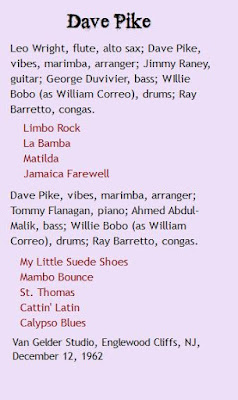Dave Pike continues his south of the border explorations, this time moving to the Caribbean. The calypso craze of Harry Belafonte and the Tarriers and even Robert Mitchum, who recorded a calypso album in 1957, had passed its zenith, but Latin dances were still enough of a thing that everyone was looking for a new one to follow the mambo and the conga line and the cha cha and the bossa nova, and even though Trinidadian calypso wasn't exactly Latin, it was close enough for pop culture (there had even been a "cha-lypso" -"When the records start a spinnin', do cha-lypso while you chicken at the hop"), so 1962 saw Chubby Checker, who had ridden the crest of the most popular dance craze of all, hitting the charts with "Limbo Rock."
Dave Pike had captured some attention with his Bossa Nova Carnival album, so why not go after the same lightning again--and again with fledgling producer Eliot Mazer? There was certainly some commercial consideration here. Chubby
LISTEN TO ONE: My Little Suede Shoes
But "commercial consideration" just means choosing and playing songs that people like, and there's nothing wrong with that, if the musicians come to play, and put their full virtuosic dexterity and creative energy into the project, which is what happens here.
"Limbo Rock" isn't the most subtle of melodies, but with Willie Bobo and Ray Barretto handling the percussion, it's lively and fun to listen to. Throughout the session, Pike alternates between vibes and marimbas -- he chose the marimbas, he explained to Juliet Lorca, who wrote the liner notes for the album, because they have a sound that's close to Trinidad's steel drums.
On the other extreme, there's Charlie Parker's "My Little Suede Shoes." Some have theorized that Parker adapted the melody from a Caribbean folk tune--Juliet Lorca suggests as much in the liner notes--but it's more likely a mashup of two French pop songs which Bird heard on a 1950 trip to Paris. One of the songs, ""Le Petit Cireur Noir," has a lyric about shoeshine man who hates suede shoes because everyone is wearing them and he's being put out of business. But then he finds a wallet stuffed with cash, buys his own shoe store, and gets rich selling suede shoes. There's no mention as to whether any of them are blue. Parker's melody--recorded with Luis Miranda on bongos and Jose Mangual on congas--is wonderfully catchy, and full of island spirit. It's a perfect choice for Dave Pike and his group, and it's a can't miss recording.
If "Limbo Rock" and "My Little Suede Shoes" are miles apart musically, they're also some distance apart in terms of orchestration. The percussionists remain, but the rest of the band -- Leo Wright on reeds and Jimmy Raney on guitar--are gone. Tommy Flanagan moves in on piano, and Ahmed Abdul-Malik replaces George Duvivier on bass.
Dave Pike was, of course, not Latin himself, and he would not remain on a Latin kick. His next album (and the last for Prestige) would go in a markedly different direction, and the rest of his career, lasting throughout the rest of the century, would take some remarkable twists and turns, through free jazz, acid jazz, funk and psychedelia. So is this cultural appropriation? That was, of course, a concept that would not be named or defined for many decades to come. Dave Pike isn't Machito or Tito Puente, but nobody is. He did turn the spotlight on a wonderful and little-known (in the States) Brazilian composer on the first album, and he has a lot of fun with some pop songs and a great Charlie Parker composition, and to quote Paul McCartney, "What's wrong with that, I'd like to know?"
"Jamaica Farewell" / "Limbo Rock" was the first single, and "La Bamba" / "My Little Suede Shoes" was the second. The album, on New Jazz (a little surprisingly--I'd thought of New Jazz as primarily a home for the less commercial fare) was called Limbo Carnival.
He would spend much of his career in Europe, not so unusual for a jazz musician, a little more unusual for a white jazz musician.



No comments:
Post a Comment